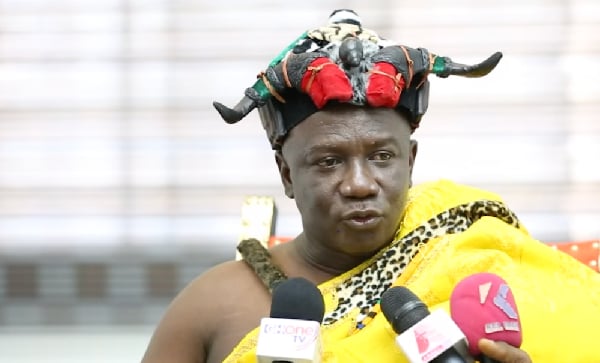Paragraph 1: A Controversial Stance
Nana Boadi Amponim Obodade II, the Kontihene of Akyem Asuom, has taken a controversial political position, expressing his desire for the New Patriotic Party (NPP) to remain in opposition for an extended period, specifically between 20 and 32 years. This statement, delivered in an interview with Kasapa FM, has ignited discussions and debates across the political landscape of Ghana. The Kontihene’s rationale for this prolonged opposition status hinges on his belief that the NPP’s performance is enhanced when they are not in power. He argues that from this vantage point, the NPP can contribute valuable ideas and perspectives to national discourse, ultimately benefiting the Ghanaian populace.
Paragraph 2: Opposition as a Catalyst for Ideas
The Kontihene’s position underscores a perceived dynamic in Ghanaian politics, where opposition parties often play a critical role in shaping public policy and holding the ruling government accountable. While not explicitly elaborated upon in his initial statement, the Kontihene’s assertion suggests a belief that the NPP’s intellectual contributions and policy proposals are more effective when they are not burdened by the practicalities of governance. This implies a certain detachment from the immediate pressures of power, allowing for a more objective and analytical approach to national issues. The Kontihene’s perspective raises questions about the nature of political engagement and the potential benefits of a robust and active opposition.
Paragraph 3: Embracing the "Operation Recover All Loot" Initiative
Beyond his stance on the NPP’s role in Ghanaian politics, the Kontihene has also expressed strong support for the National Democratic Congress (NDC) government’s "Operation Recover All Loot" (ORAL) initiative. This program, aimed at investigating and recovering misappropriated public funds, has resonated with the Kontihene, who claims to possess evidence of such looting. He intends to formally present this evidence to the ORAL committee for thorough investigation. This alignment with the NDC’s anti-corruption drive further highlights the Kontihene’s active engagement in the political landscape and his commitment to accountability in governance.
Paragraph 4: Institutionalizing Anti-Corruption Efforts
The Kontihene’s advocacy for ORAL extends beyond mere investigation; he champions its institutionalization, ensuring its longevity beyond the current presidential term of John Dramani Mahama. This call for permanence reflects a deep-seated concern about corruption within the Ghanaian political system and a desire for lasting mechanisms to combat it. By advocating for the institutionalization of ORAL, the Kontihene seeks to establish a robust and enduring framework for tackling corruption, regardless of which party holds power. This perspective aligns with the broader public sentiment for greater transparency and accountability in government affairs.
Paragraph 5: Implications and Reactions
The Kontihene’s statements have sparked diverse reactions, with some interpreting his call for prolonged NPP opposition as partisan, while others view it as a commentary on the dynamics of Ghanaian politics. The assertion that the NPP performs better in opposition opens a broader discussion about the role of opposition parties in a democracy. Does opposition provide a more fertile ground for critical thinking and policy development? Or does it risk marginalizing valuable contributions that could be made through active participation in governance? These questions remain central to understanding the Kontihene’s perspective.
Paragraph 6: The Broader Context of Ghanaian Politics
The Kontihene’s pronouncements unfold within the complex and dynamic landscape of Ghanaian politics, characterized by a vibrant multi-party system, strong public engagement, and ongoing debates about governance and accountability. His call for the institutionalization of anti-corruption measures resonates with a growing national demand for transparency and ethical leadership. The Kontihene’s statements, while controversial, contribute to the ongoing dialogue about the future of Ghanaian democracy and the role of political parties in shaping its trajectory. His outspokenness underscores the importance of diverse voices and perspectives in fostering a healthy and vibrant political discourse.














